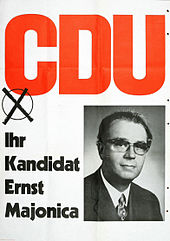Ernst Majonica
Ernst Gottfried Majonica (born October 29, 1920 in Soest ; † July 21, 1997 there ) was a German politician ( CDU ).
education and profession
Majonica studied law and history in Münster and Freiburg im Breisgau from 1939 to 1942 . This was followed by military service and Belgian and American captivity. After his release from captivity in 1946, Majonica was initially a trainee lawyer. After the assessor exam, which he passed in Düsseldorf in 1950 , he worked as a lawyer.
Between 1966 and 1976 Majonica was President of the German Council of the European Movement .
Political party
Majonica joined the CDU and the Junge Union (JU) in 1946 . From 1950 to 1955 he was federal chairman of the JU.
MP
Majonica was a member of the German Bundestag from November 19, 1950, when he was re-elected for Heinrich Lübke , until 1972. As a member of parliament that was always directly elected, he represented the constituency of Arnsberg - Soest . From 1953 to 1969 he was a member of the CDU / CSU parliamentary group. During this time he made a name for himself as a foreign policy expert for his party (head of the Working Group on Foreign and Defense Issues from 1960 to 1969), within which he belonged to the group of "Atlanticists", which represented a foreign policy more leaning towards the USA and was skeptical of Gaullist France . From 1956 he was also a member of the Defense Committee of the German Bundestag .
In 1959, Majonica belonged to a group around the Bundestag member Gerd Bucerius , which, with the support of the FDP, planned a vote of no confidence in Konrad Adenauer when he refrained from his intention to become Federal President and remained Chancellor . In terms of Ostpolitik , Majonica advocated a cautious opening towards the Eastern bloc states in the 1960s . After the social-liberal coalition took over government in 1969, he was open to the Eastern Treaty in contrast to the majority of the faction . From 1961 to 1972 Majonica was chairman of the German Parliamentary Society . In 1966 Majonica became President of the German Council of the European Movement Germany for ten years . During this time, the cooperation of the European Association with the Bundestag parliamentarians and the demand for a direct election of the European Parliament were accelerated.
From 1979 to 1984 he was a member of the first directly elected European Parliament .
Honors
Ernst Majonica was awarded the Federal Cross of Merit in 1968 and the star in 1984.
Fonts
- German Foreign Policy - Problems and Decisions. Kohlhammer, Stuttgart 1965.
- Possibilities and Limits of German Foreign Policy. Kohlhammer, Stuttgart 1969.
- A secret parliament? On the working methods of the Bundestag committees. In: Emil Hübner , Heinrich Oberreuter , Heinz Rausch (eds.): The Bundestag seen from the inside. Munich 1969, pp. 114–126.
- Bundestag and foreign policy. In: Hans-Peter Schwarz : Handbook of foreign policy. Munich / Zurich 1975, pp. 112–122.
- Bonn - Beijing. Relations between the Federal Republic of Germany and the People's Republic of China. Kohlhammer, Stuttgart 1982.
literature
- Walter Henkels : 99 Bonn heads , reviewed and supplemented edition, Fischer-Bücherei, Frankfurt am Main 1965, pp. 165ff.
- Christopher Beckmann: "A new world opened up to me." The trip of MP Ernst Majonica to Southeast Asia in 1955/56. In: Historical-Political Messages. Archive for Christian Democratic Politics. Vol. 15 (2008), H. 1. pp. 395-426.
- Jürgen Mittag : From a circle of dignitaries to a European network. Six decades of the European Movement in Germany. In: 60 Years of the European Movement Germany. Berlin 2009, pp. 12–28 ( Online ( Memento from January 18, 2012 in the Internet Archive )).
- Günter letter : Ernst Majonica (1920–1997). In: Wolfgang Elz , Sönke Neitzel (ed.): International relations in the 19th and 20th centuries. Festschrift for Winfried Baumgart on his 65th birthday. Paderborn 2003, pp. 429-447.
Web links
- Literature by and about Ernst Majonica in the catalog of the German National Library
- Entry on Ernst Majonica in the Members' database of the European Parliament
Individual evidence
- ↑ Important results of the European elections on June 10, 1979 in Dortmund . In: Office for statistics and elections of the city of Dortmund (Hrsg.): Dortmunder Statistics . Special issue 80, March 1980, p. 4 ( dortmund.de [PDF]).
- ↑ Jürgen Mittag: From the circle of dignitaries to the European network: Six decades of European movement in Germany. In: 60 Years of the European Movement Germany. Berlin 2009, p. 21.
| personal data | |
|---|---|
| SURNAME | Majonica, Ernst |
| ALTERNATIVE NAMES | Majonica, Ernst G .; Majonica, Ernst Gottfried |
| BRIEF DESCRIPTION | German politician (CDU), Member of the Bundestag, MEP |
| DATE OF BIRTH | October 29, 1920 |
| PLACE OF BIRTH | Soest , North Rhine-Westphalia |
| DATE OF DEATH | July 21, 1997 |
| Place of death | Soest , North Rhine-Westphalia |

